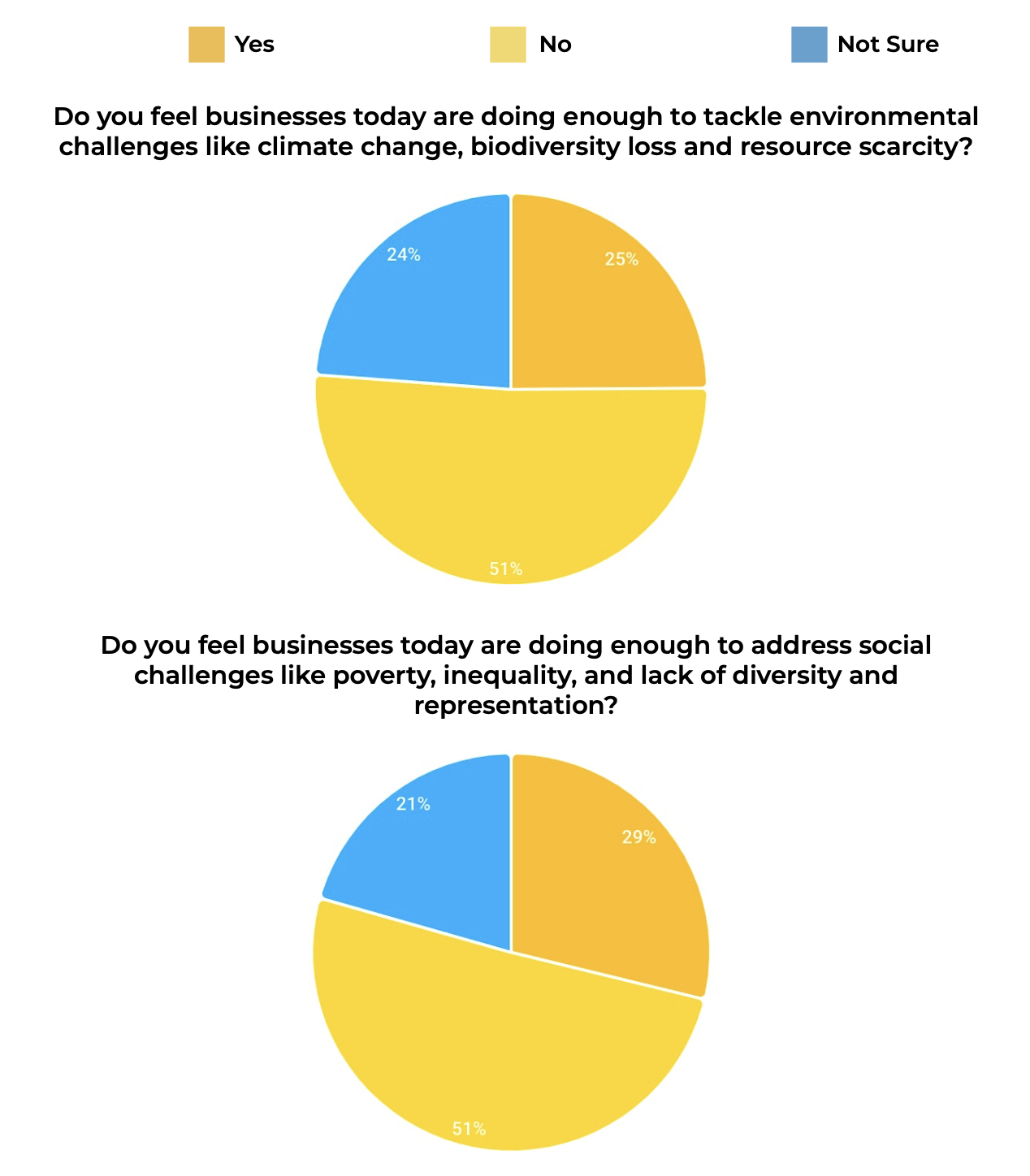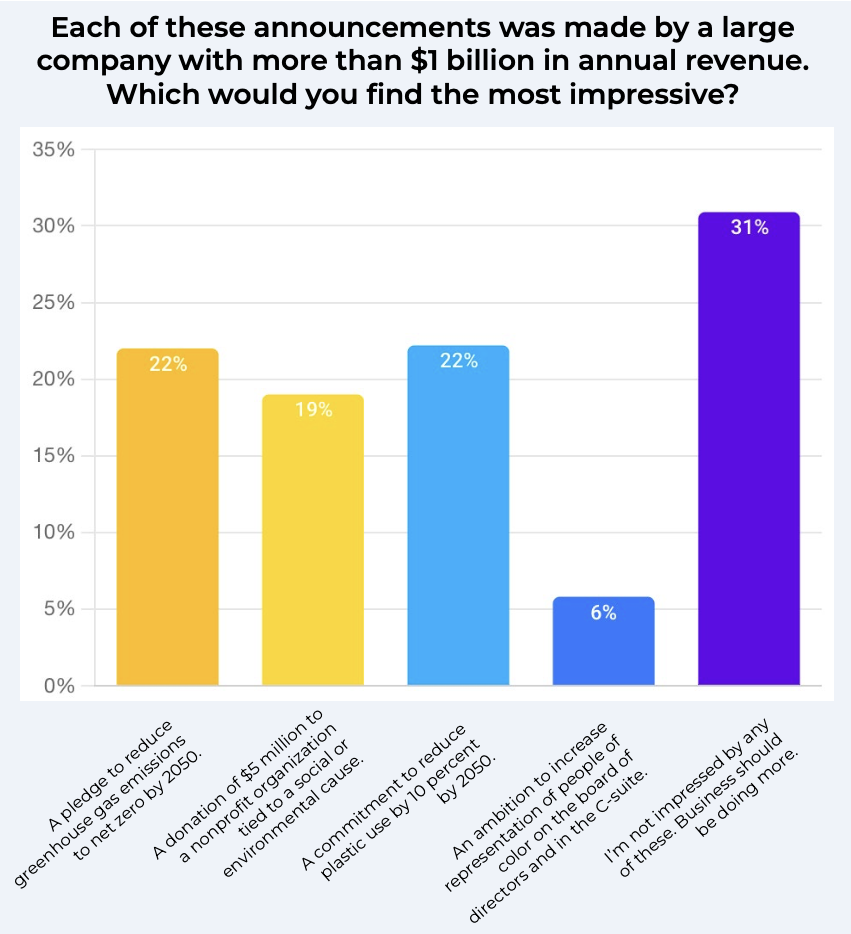
Environmental sustainability and social impact are of increasing interest to U.S. consumers — and their expectations around how business responds to these issues are rising fast, according to research from TriplePundit released today.
When TriplePundit first got started back in 2005, the intersection of sustainability and business was a niche topic with a niche audience — made up primarily of professionals working in the field. Fast forward to today, and 67 percent of Americans say they read news about sustainability, the environment and social well-being on a regular basis, according to a December survey of 3,648 U.S. adults conducted by TriplePundit and our parent company, 3BL Media, in partnership with the research technology firm Glow.
Survey says: Consumers care about sustainability, and most don't think business is doing enough
Our findings are living proof of what professionals in the sustainability and social impact space have been saying anecdotally for years: Interest in — and awareness of — sustainability issues are on the rise across the board.
That means businesses looking to increase their sustainability profiles will have a receptive audience among the public. But with greater awareness comes greater responsibility: Just over half (51 percent) of consumers say business is not doing enough to tackle social and environmental problems, according to our survey.
Business leaders are challenged to get legit in their sustainability efforts and prove to consumers they're worthy of their patronage (and their trust). TriplePundit and 3BL Media's report offers a set of key actions for companies to improve how they approach sustainability and communicate their efforts to consumers. But first let's take a closer look at what consumers are saying.

We're not as divided as we might think
The "anti-ESG" movement continues to make headlines in the U.S., as conservative politicians and pundits publicly challenge the use of environmental, social and governance (ESG) standards in business. They argue that ESG and other sustainability considerations hurt company bottom lines and dampen investor returns — and they claim the public agrees with them.
This rising rhetoric has many thinking the U.S. is sharply divided on how business should respond to social and environmental issues. But public polling indicates that isn't exactly the case, and our survey is no exception.
We found interest in sustainability and social impact hold steady across demographic, socio-economic and political perspectives. Those in more traditionally “red” or conservative parts of the country were statistically just as likely to express interest in these topics as those from the coasts, and over 60 percent of Gen X and baby boomers also read about them often.
Consumers from coast to coast and across income levels also listed climate change as a top concern facing society today, closely behind the rising cost of living. And they all agreed business is not doing enough to respond, regardless of their age, where they live or how much they earn.
"That people can meet across the political aisle on urgent challenges like climate change is a welcome reality check at a time when some politicians and pundits are exploiting a perceived divide to sow distrust," the report reads. "There is more room for agreement and compromise than some skeptics would have us believe."
It's time for business to move beyond table stakes
Okay, so consumers feel companies aren't doing enough, but what do they really mean by that? To get a better understanding, we presented four common corporate commitments related to sustainability and social well-being.
The pledges will sound familiar: reach net-zero greenhouse gas emissions by 2050, cut plastic use by 10 percent by 2050, donate $5 million to a social or environmental cause, and increase representation of people of color on the board of directors and in the C-suite. We attributed the pledges to a hypothetical large company with revenues exceeding $1 billion annually and asked consumers what they thought of them.
The results weren't great: None of the pledges were deemed “impressive” by more than 22 percent of respondents. Close to a third (31 percent) were underwhelmed by all of the commitments and said business should be doing more.

This is a strong indicator that consumer expectations around sustainability are fast outpacing how they perceive corporate ambition. It's not to say objectives like zeroing-out greenhouse gas emissions are easy to accomplish, but consumers have come to expect these commitments. To be recognized by consumers, businesses are challenged to do more — and communicate more.
How should business respond?
TriplePundit and 3BL Media have nearly two decades of experience communicating about sustainability. Building on our survey, the Consumer Insights and Sustainability Benchmark report includes key action items for businesses looking to respond to consumer sentiment and get noticed among the public for their sustainability efforts. Here's a taste of what you'll find:
- Message matchmaking: How business can court consumers with sustainability commitment. "With both companies and consumers looking to become more sustainable, the time is ripe for the two to form deeper relationships to achieve shared goals like climate action, fairer opportunities for all, and transparency about what is being done. It’s up to companies to forge those relationships and connect with consumers in a way that resonates."
- Build the foundation for your sustainability story. "To gain and retain consumer trust, lay a foundation of transparency for your sustainability stories. Our findings show that consumers are not impressed by vague, grandiose statements of corporate sustainability ambition. Instead, be specific and open about your company’s progress, including hitting and overcoming obstacles."
- Lead with what’s relatable. "Sustainability storytelling starts with impact: Who does the program help, and how much? As revealed in our survey, consumers want to know more about and understand outcomes. By making positive outcomes the center of your ESG story, you immediately engage your audiences and show them you’re making real progress on the issues they care about."
- Help consumers be part of the solution by providing education. "Since consumers want to be part of the solution, help them do that by sharing actionable information. It may be as simple as telling them how to make your product last longer or how to lower their personal carbon footprint with a checklist on your website. You can celebrate your company’s successes by applauding theirs."
For more insight on telling your sustainability story — including where consumers are seeking out information on sustainability and how to reach them — download the full report here.
Image credit: Volodymyr Hryshchenko/Unsplash and Yaroslav Shuraev/Pexels

Mary has reported on sustainability and social impact for over a decade and now serves as executive editor of TriplePundit. She is also the general manager of TriplePundit's Brand Studio, which has worked with dozens of organizations on sustainability storytelling, and VP of content for TriplePundit's parent company 3BL.














